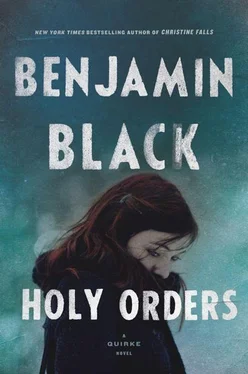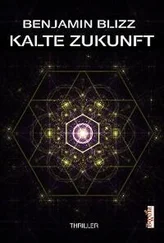The barman brought their drinks on a pewter tray. The bespectacled young priest at the other table was watching them again, and again spoke in an undertone to the other two. Quirke sat silent, his eyes fixed on the cigarette case on the table. He was trying to make out the monogram on the lid.
“Would I be right in thinking, Doctor,” Father Honan said, tipping a little water into his whiskey from the jug the barman had brought, “that you’re not a believer?” He offered the jug to Quirke, who shook his head. “Well, to tell you the truth, neither am I.” Quirke stared, and the priest smiled back happily, pleased with the effect his words had produced. “You’re shocked, I can see.” Quirke took a drink and felt the whiskey spreading hotly through a network of branching filaments behind his breastbone; remarkable how that sensation seemed new every time. “I’d make a further guess,” the priest said, “that you’ve not had the happiest of experiences at the hands of the clergy.”
“I was at Carricklea,” Quirke said. “I spent a long time there, when I was a child.”
The priest turned his mouth down at the corners and slowly nodded. “Ah, yes,” he said. “I thought it would be something like that.”
Quirke looked to the window again. The rain had stopped, and the street out there glistened in the darkness between the pools of light falling from the streetlamps. He had almost forgotten why he was here, in Flynne’s Hotel, drinking whiskey and trying not to think of the past. What did this priest want with him? Why had he spoken of Costigan — why had he brought up that name, of all names? He saw yet again the canal bank in the darkness, the leaning, listening trees.
“When I say I’m not a believer,” the priest said softly, glancing towards the trio at the other table, “I should explain what I mean. The church, Dr. Quirke, like heaven, has many mansions. There’s room in it even for the skeptic.” He chuckled, a fan of fine wrinkles opening outwards at the side of each eye. “I fear our poor old Mother Church doesn’t always act in her own best interest. It’s a broad church, of course, and has to pay heed to all sorts and varieties of belief and opinion and prejudice across the world, in America, in Africa, in Asia, even. But she has an unfortunate way — I think it’s unfortunate — of treating all her children as if they were just that, children. Look at our own benighted little country, hidebound by rules and regulations formulated in the corridors and inner chambers of the Vatican and handed down to us as if graven on tablets of stone. So when I say I’m not a believer, it’s that church — which I think of, the Lord forgive me, as the Church of the Blessed Infants — that I turn a skeptical eye towards. No: my church is the one that traces its roots back to Greece and classical Rome, not the arid deserts of Palestine and the childish people who lived there when the Bible stories were written. My church is the church that recognizes the tragic element in our lives. My church is the Mater Misericordiae, the mother of sorrows and forgiveness, who spreads her cape wide and shelters all of us, saint and sinner alike.”
He stopped, and laughed quietly, and leaned forward again. “Forgive me, Dr. Quirke,” he murmured, “I must remember I’m not in the pulpit. In fact, I’m rarely in the pulpit, and not often in church, either, for that matter. My work is carried on in the streets, in the tenements, in the campsites of the traveling people. I don’t flatter myself that this makes me a better minister of God than the monk in his cloister or even the lowly lawgiver in the Vatican. We all have our allotted tasks, our theaters of operations.”
One of the old ladies across the way rose and tottered to the bar, an empty glass in each hand. “Ah, Mags,” the barman said, pretending to be cross, “you should have shouted and I’d have come over to you.”
Outside, in Abbey Street, a lone drunk passed by, singing “Mother Machree” in a high, strained, sobbing tenor voice.
“You’re going to Africa yourself, I hear,” Quirke said.
The priest put on an exaggeratedly doleful expression. “I am — for my sins. Nairobi first, then some godforsaken parish out in the bush that will be twice the size of Ireland, I don’t doubt.”
“Have you been there before?”
“Not that part. I was in Nigeria for a while, some years back. I still come down with fever in the rainy season. What about yourself? Do you ever travel?”
“I used to go to America — worked there years ago, in Boston.”
“Ah, Boston is a grand city.”
The drunk could be heard from somewhere along the rain-washed street, still crooning tearfully.
“Have you family yourself, Dr. Quirke?” the priest asked.
“No. My wife died.”
“But you have a daughter?”
Quirke frowned. “Yes, I have,” he said. “I forget, sometimes.”
The priest gazed at him in silence for a long moment. He seemed to be thinking of something else. “Your father was Garret Griffin,” he said, “am I right?”
“My adoptive father, yes.”
“A fine man, Garret.”
“Did you know him?”
“I came across him now and then. A great friend of the church.”
“A great friend of your man Costigan, too.”
The priest smiled, biting his lip. “I don’t believe Joe has friends, as such.”
“What, then?”
A little flurry of tension gripped the air between them, as if a dust devil had suddenly risen up in a dervish dance on the tabletop. “We’re both men of the world, Doctor,” the priest said. “And a hard and recalcitrant world it is.”
“So there must be people like Costigan to keep it all in check.”
“To keep some of it in check,” the priest said, and smiled, softly reproving. “But even the church’s powers are limited — even Joe Costigan can’t control everything.”
Quirke stood up and went to the bar and asked for two more whiskeys. There was a constriction in his chest and his heart was doing its muffled, trapped-bird thrashings. Was this, he wondered in alarm, the preliminary to another bout of alienation and fantasy, like the one he had undergone at Trinity Manor? He had been in the presence of a priest on that occasion, too. Maybe he was developing an allergy to men of the cloth. Or maybe he was just angry at the thought of Costigan and his endless machinations.
He turned now, while the barman was preparing the drinks, and saw that Father Honan had risen from his chair and was standing by the table where the trio of clerics was seated, his hands in his pockets, saying something and laughing. The three men sat looking up at him with awed expressions. He would be a star in their firmament, of course, the famous Father Mick, champion of the poor and the downtrodden, the kiddies’ friend, the tamer of drunken fathers and lawless tinkers.
Quirke carried the drinks to the table. Father Honan, with a parting quip that left his three admirers shaking their heads and chuckling, came back and sat down. “My Lord, Doctor,” he said, picking up his glass and admiring the whiskey’s amber glow, “you’ll have me under the table.”
“You didn’t know Jimmy Minor, then,” Quirke said.
The priest looked from the glass to him and back again. He took his time before answering. “I think I said, didn’t I, that I’d never met the poor chap?”
“Yet he must have known of you, or something about you.”
The gray eyes narrowed again, glinting. “Something about me?” the priest said, very softly. When he spoke like this, so quietly, he seemed to caress the words, and Quirke thought of a hand with fine pale hairs on the back of it caressing a cheek, fresh, smooth, unblemished.
“He wrote to you,” Quirke said. “He asked to interview you.”
Читать дальше












